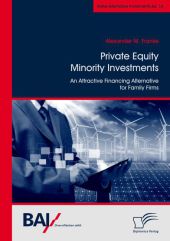 Neuerscheinungen 2015Stand: 2020-02-01 |
Schnellsuche
ISBN/Stichwort/Autor
|
Herderstraße 10
10625 Berlin
Tel.: 030 315 714 16
Fax 030 315 714 14
info@buchspektrum.de |

Alexander M. Franke
Private Equity Minority Investments: An Attractive Financing Alternative for Family Firms
2015. 96 S. 13 Abb. 210 mm
Verlag/Jahr: DIPLOMICA 2015
ISBN: 3-9593462-1-2 (3959346212)
Neue ISBN: 978-3-9593462-1-4 (9783959346214)
Preis und Lieferzeit: Bitte klicken
Private equity minority investments have become an increasingly attractive financing alternative for family firms. However, admitting a private equity investor as a minority shareholder seems to contradict with the objective of the owner family to preserve their continuous and unlimited influence on the businesses since they must at least partially cede control over the firm to the private equity investor. Therefore, the purpose of this book is to identify the primary decision drivers for family firm entrepreneurs in seeking private equity financing despite the therein related partial loss of control. By giving special consideration to the potential cooperation mechanisms between the shareholders, this book goes beyond the scope of previous studies. Cooperation is thereby considered as a prerequisite for the success of minority investments because due to its minority position, the private equity investor is not able to implement its value creation strategy against the will of the family firm entrepreneur.
Alexander M. Franke, born in Frankfurt am Main, Germany in 1989, holds a degree in Business Administration (B.Sc.) and Finance (M.Sc) from Frankfurt School of Finance and Management. He gained first experience in the banking industry by working in the corporate finance department of a large German Landesbank. Today he works in the structured finance unit of a leading international bank in Frankfurt am Main.
Focussing on corporate finance topics during his master studies, the author was fascinated by the increasing number of family firms accepting private equity firms as minority investors. His research led to the present study examining the cooperation mechanisms between family firms and private equity investors.


